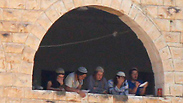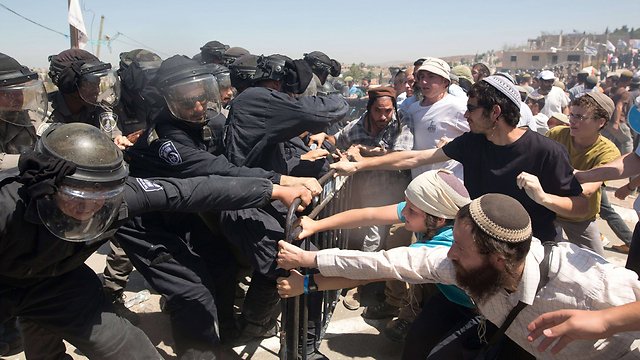
Settlers in Sa-Nur. We must remember that settlers are not a homogenous bunch
צילום: EPA
The leading handful of violent settlers
Op-ed: The group of settlers clashing with security forces tarnishes the image of all settlers, most of whom are law-abiding citizens who have nothing to do with violence and provocations.
The 10th anniversary of the disengagement from Gaza is a good time for self-examination, both among the settlers and among the general Israeli public. Are the illegal takeover of the ruins of Sa-Nur and the fight over the Draynoff buildings in Beit El part of self-examination conducted by some of the settlers?

The word "settlers" actually does injustice to the individuals. It presents, one the one hand, an active group which has no problem using provocations and violence and violating the law, and on the other hand, a passive law-abiding group which accepts the rules of the democratic game. A clear line separates between these two groups, although not everyone notices it. The settlers, we must remember, are not a homogenous bunch.
Back to the disengagement. The dry, although grim, facts fail to support the settlers' claim that the disengagement was a failure. The Israeli death toll in the five years before the disengagement is higher than the death toll in the past decade, including the casualties of Operation Protective Edge.
But one fact seems undisputable: The residents of Gush Katif paid a personal heavy price and are carrying serious feelings of discrimination due to the problematic handling of their rehabilitation and the lack of solidarity from the majority of the public, which supported the disengagement.

Settlers clash with security forces in Beit El. What an ordinary citizen sees is a group of people using violence to impose its way (Photo: AFP) (צילום: AFP)
The evictees blame the government's powerlessness, although their patrons were part of those governments. However, it's not a stingy hand which prevented their rehabilitation, but problematic conduct which some say was directed by right-wing politicians who sought to perpetuate the victims of the evacuation as a lesson for all to see.
This doesn’t, of course, diminish the suffering of those who have lost their homes. Yet it seems that the lack of solidarity stemmed from the public's difficulty to distinguish between the support for the move and the acknowledgement of the evictees' suffering due to the labeling of the settlers – and the evictees among them – as a provocative group which sees the ideology it believes in as the most important thing.
This labeling leans on fertile ground which has grown over the years and was demonstrated this week. What an ordinary citizen sees is a group of people which uses violence to impose its way. It seems that the moment they are given the signal, these people leave their homes, their work, their ordinary lives and join the war. And the war is against the State, which feeds the enterprise they sanctify.
The determination of those "recruits" to fight for their way and ideological belief on hot summer days instead of sitting in their air-conditioned home or taking a vacation could be watched with astonishment, and even with appreciation. And we could – and that appears to be the feeling of a large public – express anger over the waste of resources, the clashes with the security forces and the fact that they are acting as if the Judea and Samaria settlements are the heart of the country and everything else is deserted lands.
That handful projects on all the settlers, most of whom are law-abiding citizens who are far from provocations. That handful activates the right-wing politicians and opinion leaders, generating dangerous statements, clashes with the security forces or "price tag" activities. This is the way which creates a gap between the broad public and all the settlers. And that gap may be the reason why the public has shut itself off and has been incapable of containing the Gush Katif evacuees' suffering in recent years.
In a post he wrote on the eve of the elections, Hagai Huberman, a military correspondent and commentator affiliated with Religious Zionism, blamed IDF widow Michal Keidar, who "dared" speak at a left-wing rally, for the death of her husband, Lieutenant Colonel Dolev Keidar, because she had supported the disengagement. Huberman is not an anonymous talkbacker, and his outrageous comments are an example of the material which builds alienation.
Nonetheless, this is the place to hope that we will learn a lesson in empathy and succeed in detecting human distress even in the depths of the sea of ideology.










